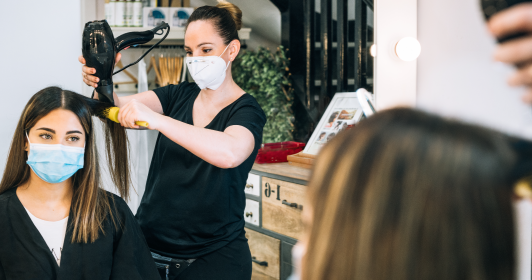
Natural Ways to Support Your Aging Body
, by Hi-Health, 4 min reading time

, by Hi-Health, 4 min reading time

While you can’t stop your body from aging, you can try to age gracefully by understanding what triggers the aging process.
Aging, is well, a fact of life. As you grow older, looking older is simply a reality. Although you may not be able to stop your skin and bones from aging, you can understand what triggers the aging process, to perhaps slow it down, or at least, keep it from speeding up. “When you are young, you have plenty of skin cells growing and regenerating all the time,” says New York dermatologist Ariel Ostad, MD. “The problem is that skin cells can only divide a certain number of times.” That means that as you age, the regenerative process decelerates. The result: Collagen and elastin, compounds that keep skin looking firm, start to break down; that’s when you start to notice wrinkles, sagging, discoloration, and a change in skin texture.
The process is similar with your bones. Even though they’re solid, bones are dynamic, living tissue, made mostly from collagen and calcium phosphate, a mineral that hardens bone exterior. But as you age, existing bone breaks down faster than new bone is made, increasing risk of osteoporosis, a condition that reduces bone density and raises chances of fractures.
Although there’s no perfect formula to fend off aging, consider these tips to help you age gracefully:
 Fried foods, white bread, alcohol, and white sugar are not your friends in aging. On the skin front, they create inflammation and attack collagen, leading to breakouts and premature aging. Choose foods that support collagen production, such as dark leafy greens, red fruits and vegetables, and foods rich in vitamin C, such as citrus and berries.
Fried foods, white bread, alcohol, and white sugar are not your friends in aging. On the skin front, they create inflammation and attack collagen, leading to breakouts and premature aging. Choose foods that support collagen production, such as dark leafy greens, red fruits and vegetables, and foods rich in vitamin C, such as citrus and berries.
The same goes for your bones. Foods common in poor diets promote an acidic body environment, says Ann Gibson, CHHC, founder, AdventureWellness.com. To achieve and maintain a healthy, neutral blood pH, your body will scavenge important minerals like calcium, phosphorus, zinc, and silica from more alkaline tissues, such as bone, weakening bones in the process. Gibson recommends limiting acidic foods like sugar, grains, dairy, caffeine, and alcohol, and increasing pH-balancing vegetables like zucchini and cucumber.
Of course, as we all know, water is your friend—always. Try minimizing your coffee and alcohol intake, while choosing to up your water intake. In addition to helping every process in your body, water is the building block of youthful skin. Be sure to get the equivalent of at least 8 cups daily. You can cover about one-third of your daily water intake from water-rich foods, such as green leafy vegetables. Also supplement with and apply topical products containing hyaluronic acid— an ingredient that holds up to 1,000 times its weight in water.
 You may not get enough of some important nutrients from diet alone; plus your body produces less of key nutrients as you age. Focus on antioxidants such as vitamins A, C, and E and resveratrol, which fight skin-harming free radicals. Fatty acids in fish oil and algae capsules keep skin supple and moisturized.
You may not get enough of some important nutrients from diet alone; plus your body produces less of key nutrients as you age. Focus on antioxidants such as vitamins A, C, and E and resveratrol, which fight skin-harming free radicals. Fatty acids in fish oil and algae capsules keep skin supple and moisturized.
Collagen, skin’s most prominent protein, depletes with age, making supplementation key. Likewise, collagen forms bones’ scaffolding, enabling them to withstand stress, says Gibson. If you’re protein deficient, bones can become brittle, leading to breakage no matter how much calcium they contain.
In fact, too often people think calcium is the key to bone health, when in fact many people actually have too much calcium in their bodies, says Justin Pollack, ND, co-owner Mountain-River Naturopathic Clinic, in Frisco, Colorado. This can contribute to kidney stones, joint pain, and possibly heart disease. Vitamin K2 regulates excess calcium deposits and supports bone integrity. Try 100 mcg of vitamin K2 per day.
 There’s no denying that sleep benefits your body and eight hours a night really is ideal. During sleep, your body repairs and replenishes bone cell supply and gives your skin cells time to regenerate. Boost your sleep quality by reducing stress. Stress is linked to chronic immune dysfunction, increased production of reactive oxygen species, and DNA damage—all of which contribute to skin aging.
There’s no denying that sleep benefits your body and eight hours a night really is ideal. During sleep, your body repairs and replenishes bone cell supply and gives your skin cells time to regenerate. Boost your sleep quality by reducing stress. Stress is linked to chronic immune dysfunction, increased production of reactive oxygen species, and DNA damage—all of which contribute to skin aging.
Activities that slow your heart rate promote sleep, says Pollack, so read or meditate before bedtime, or practice yoga several times per week.

BY: JESSICA RUBINO AND CREE CORNEJO
Article from September/October 2015 Living Healthy Everyday Magazine. Download your copy here.


![PRōZE Review [2020 Update]](http://hihealth.com/cdn/shop/articles/cbd_insider_article_graphic_featured_image-11.jpg?v=1591495027)